BIOL 121
South University
All 6 results
Sort by
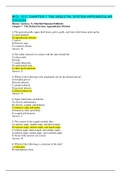
-
BIOL 121C CHAPTER 7 THE SKELETAL SYSTEM APPENDICULAR DIVISION | 100% CORRECT
- Exam (elaborations) • 9 pages • 2021
-
- $12.49
- + learn more
BIOL 121C CHAPTER 7 THE SKELETAL SYSTEM APPENDICULAR DIVISION Human Anatomy, 7e (Martini/Timmons/Tallitsch) Chapter 7 The Skeletal System: Appendicular Division 1) The pectoral girdle, upper limb bones, pelvic girdle, and lower limb bones make up the A) axial skeleton. B) appendicular skeleton. C) pelvis. D) thoracic cage. E) vertebral column. 2) The radial structures in contact with the ulna include the A) ulnar notch. B) head. C) radial tuberosity. D) antebrachial joint. E) ...
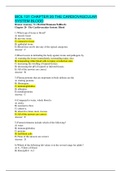
-
BIOL 121 CHAPTER 20 THE CARDIOVASCULAR SYSTEM BLOOD | VERIFIED SOLUTION
- Exam (elaborations) • 10 pages • 2021
-
- $12.49
- + learn more
BIOL 121 CHAPTER 20 THE CARDIOVASCULAR SYSTEM BLOOD Human Anatomy, 7e (Martini/Timmons/Tallitsch) Chapter 20 The Cardiovascular System: Blood 1) What type of tissue is blood? A) muscle tissue B) nervous tissue C) connective tissue D) epithelial tissue E) Blood does not fit into any of the typical categories. 2) Blood assists in defending the body against toxins and pathogens by A) warming the tissues immediately surrounding injury sites. B) transporting white blood cells to injury o...
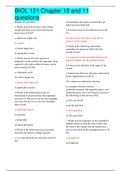
-
BIOL 121 Chapter 10 and 11 questions 100% CORRECT
- Exam (elaborations) • 8 pages • 2021
-
- $13.49
- + learn more
Chapter 10 questions 1. Which muscle draws the corner of the mouth laterally, and is innervated by the facial nerve (N VII)? a. depressor anguli oris b. risorius c. levator anguli oris d. zygomaticus major 2. Which muscle of facial expression originates on the maxilla and zygomatic bone, superior to the infra-orbital foramen, and is innervated by CN VII? a. orbicularis oculi b. levator anguli oris c. levator labii superioris d. zygomaticus minor 3. Which of the following muscle...
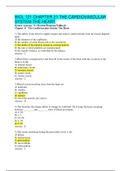
-
BIOL 121 CHAPTER 21 THE CARDIOVASCULAR SYSTEM THE HEART | GRADED A
- Exam (elaborations) • 11 pages • 2021
-
- $12.49
- + learn more
BIOL 121 CHAPTER 21 THE CARDIOVASCULAR SYSTEM THE HEART Human Anatomy, 7e (Martini/Timmons/Tallitsch) Chapter 21 The Cardiovascular System: The Heart 1) The ability of the blood to supply oxygen and remove carbon dioxide from the tissues depends upon A) the diameter of the capillaries. B) the number of white blood cells in the circulation. C) the ability of the blood to remain in constant motion. D) the rate at which platelets are manufactured. E) the osmotic balance, as controlled by ...
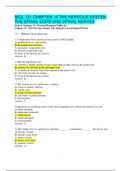
-
BIOL 121 CHAPTER 14 THE NERVOUS SYSTEM THE SPINAL CORD AND SPINAL NERVES
- Exam (elaborations) • 13 pages • 2021
-
- $12.49
- + learn more
BIOL 121 CHAPTER 14 THE NERVOUS SYSTEM THE SPINAL CORD AND SPINAL NERVES Human Anatomy, 7e (Martini/Timmons/Tallitsch) Chapter 14 The Nervous System: The Spinal Cord and Spinal Nerves 14.1 Multiple-Choice Questions 1) Components of the central nervous system (CNS) include A) peripheral nerves and ganglia. B) the spinal cord and brain. C) autonomic components only. D) efferent components only. E) None of the answers are correct. 2) The cervical spinal cord A) contains a smaller...
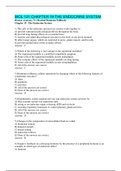
-
BIOL 121 CHAPTER 19 THE ENDOCRINE SYSTEM | VERIFIED GUIDE
- Exam (elaborations) • 11 pages • 2021
-
- $12.49
- + learn more
BIOL 121 CHAPTER 19 THE ENDOCRINE SYSTEM Human Anatomy, 7e (Martini/Timmons/Tallitsch) Chapter 19 The Endocrine System 1) The cells of the endocrine and nervous systems work together to A) provide widespread physiological effects throughout the body. B) provide long-lasting effects on a systemic basis. C) monitor and adjust physiological activities in the body at any given moment. D) affect target organs, which are restricted to nerve, gland, muscle, and fat cells. E) provide gradual o...

How did he do that? By selling his study resources on Stuvia. Try it yourself! Discover all about earning on Stuvia


